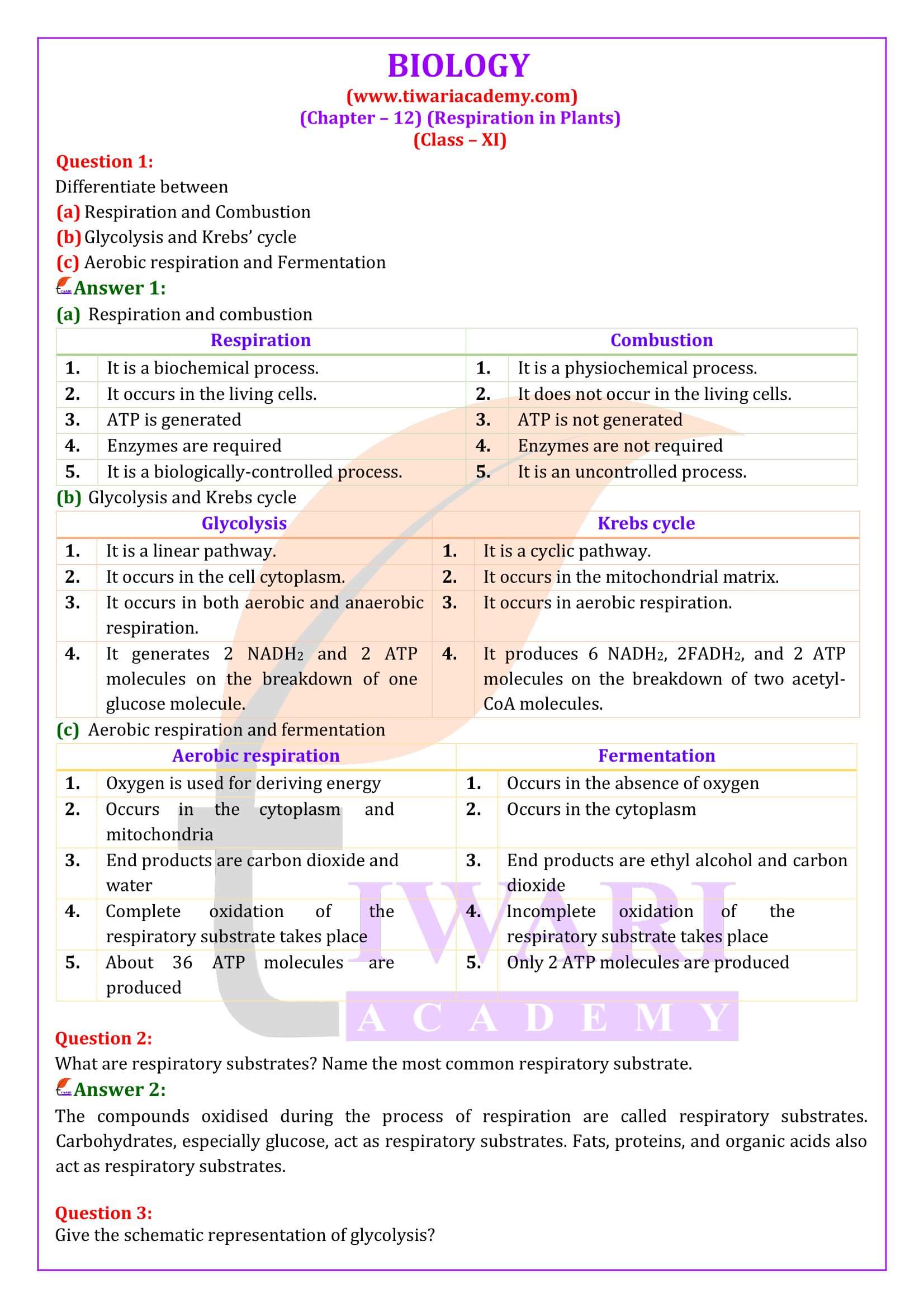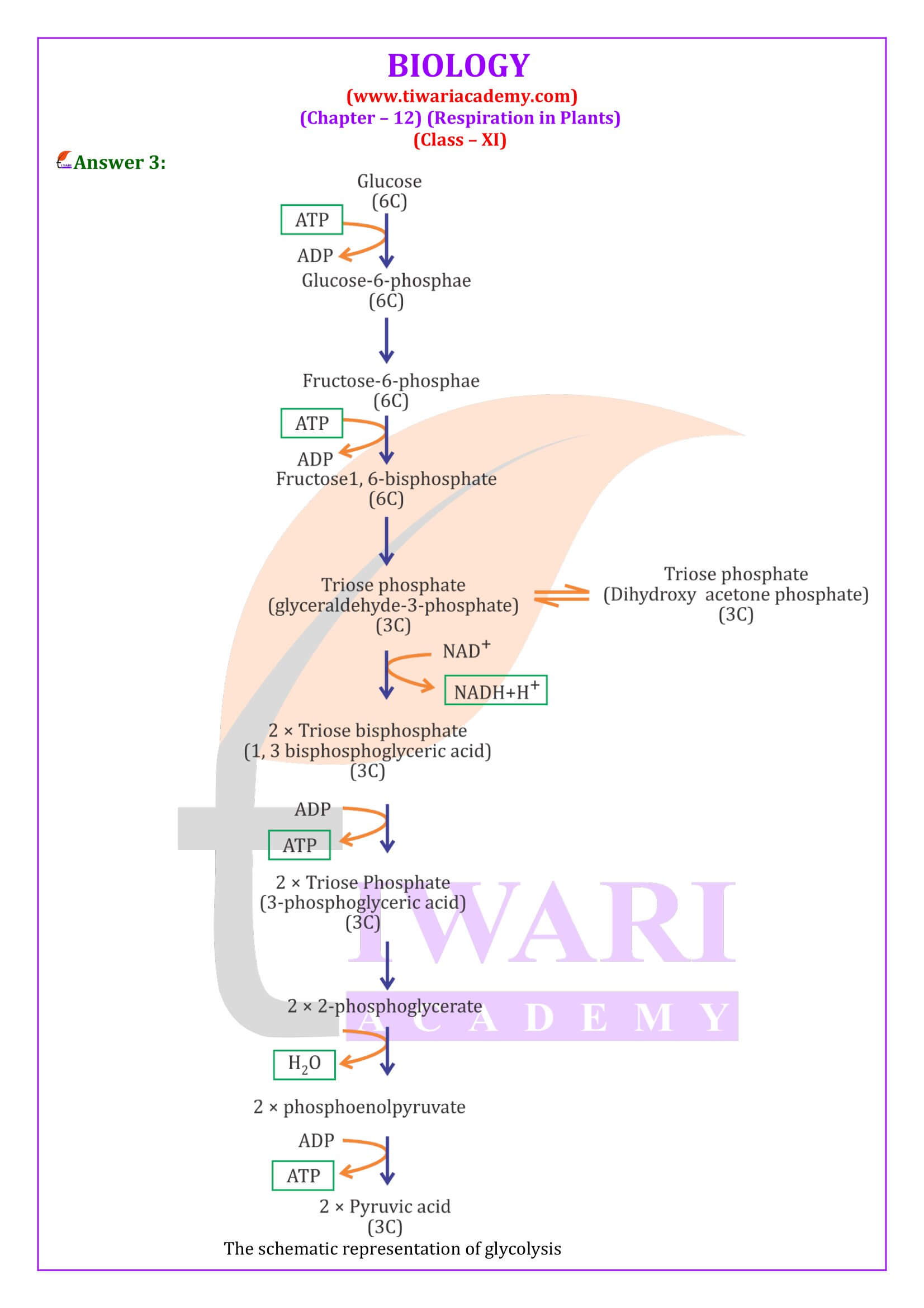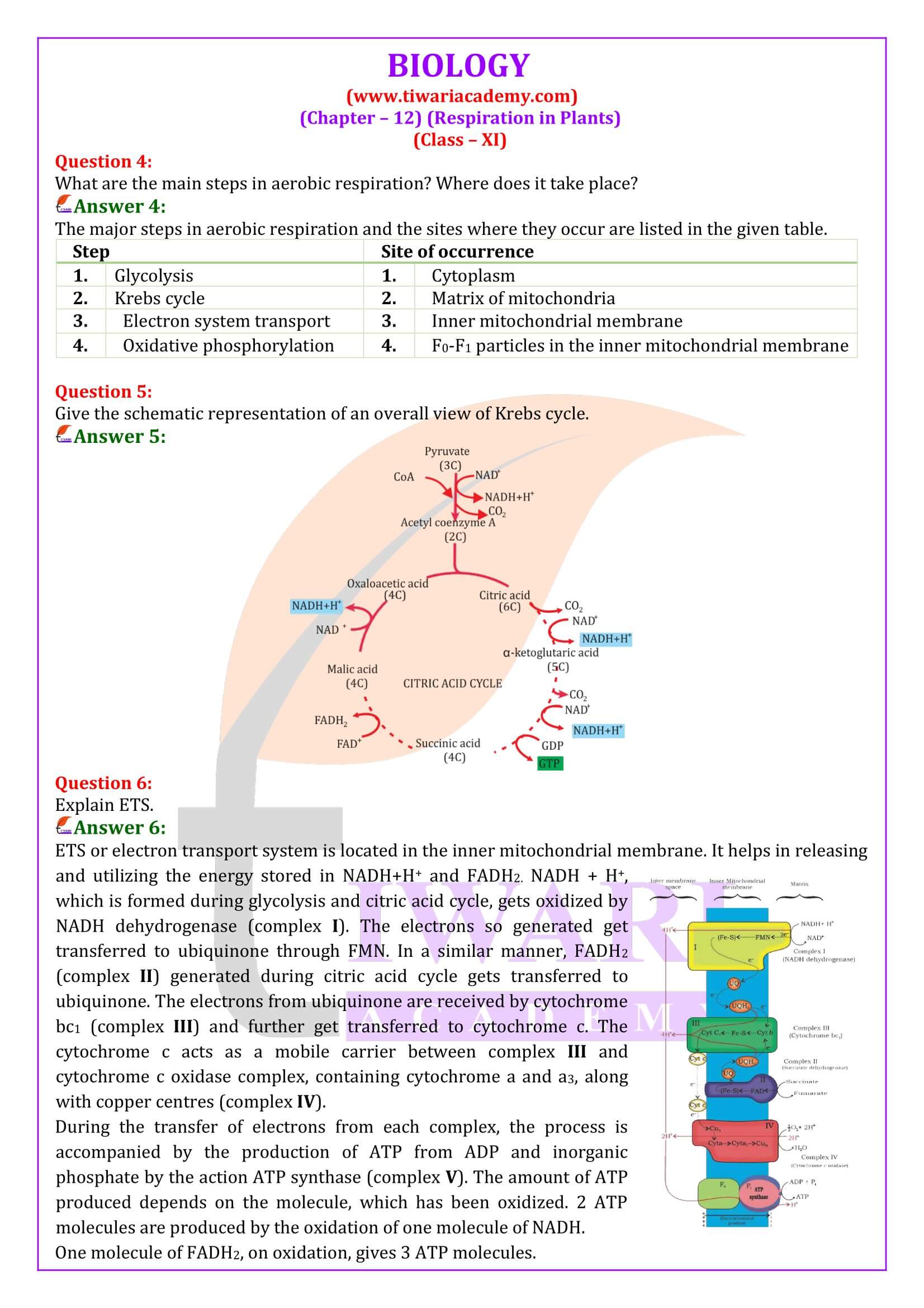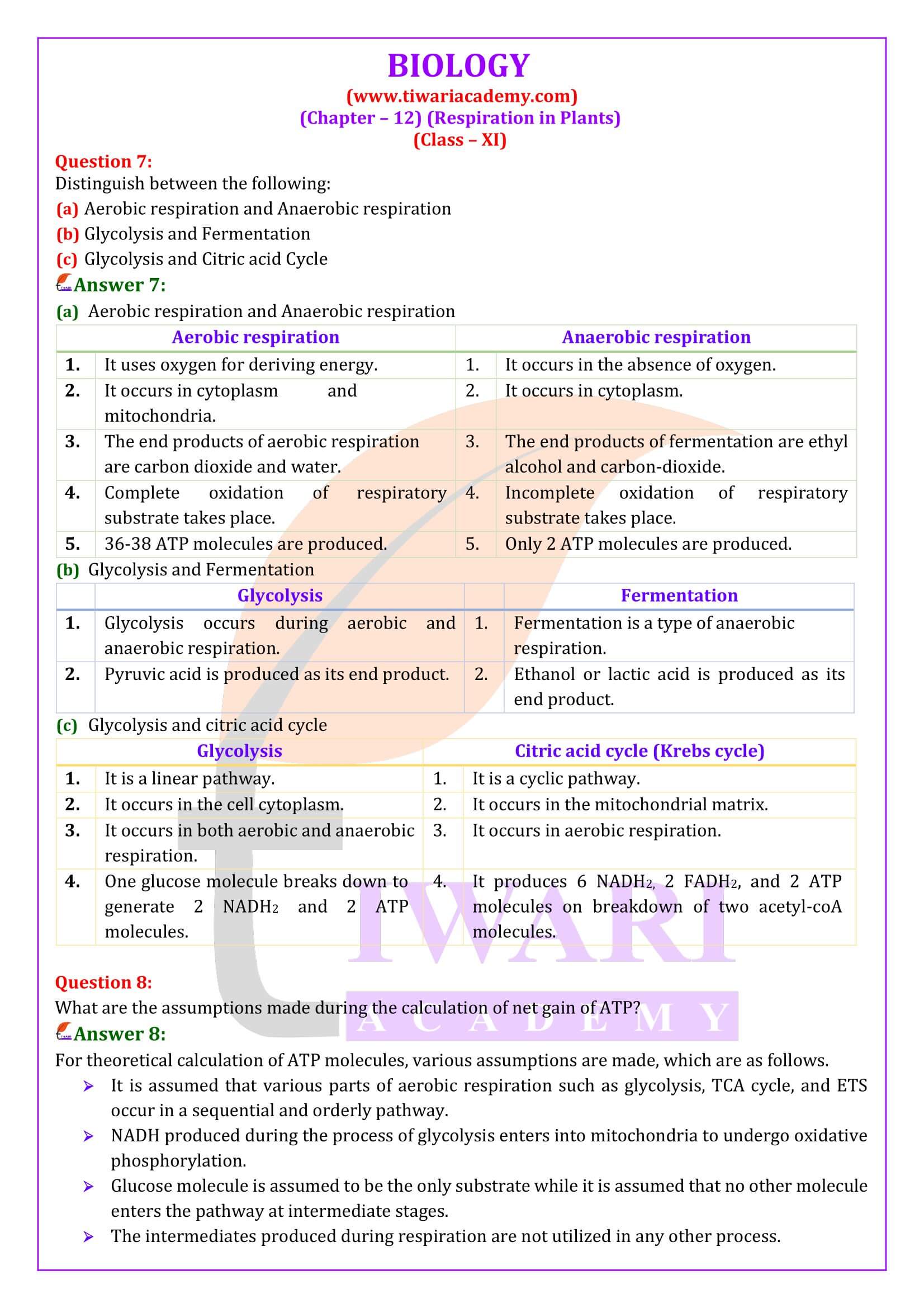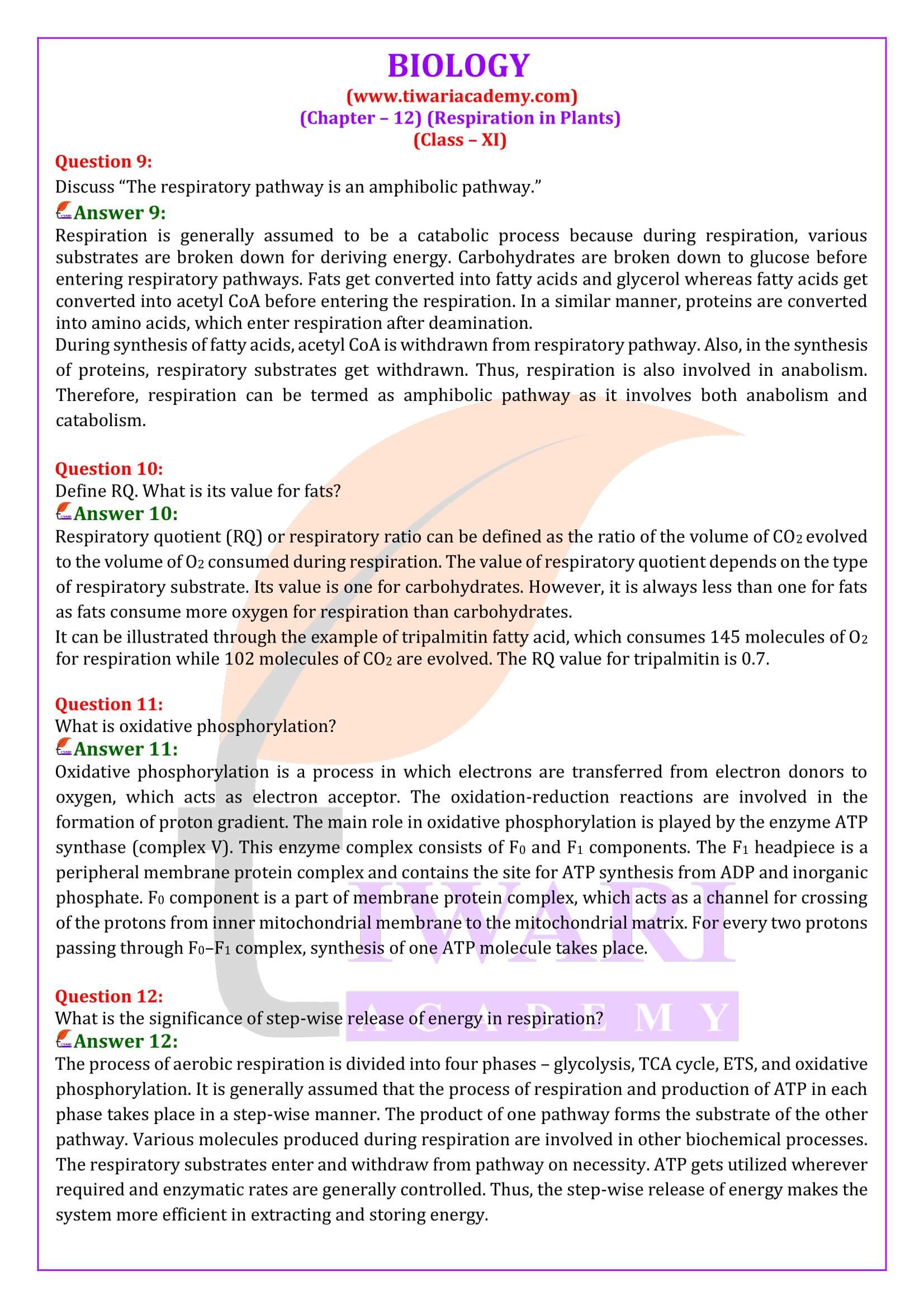NCERT Solutions for Class 11 Biology Chapter 12 Respiration in Plants in Hindi and English Medium download in PDF. Study online without downloading free updated for UP, MP, CBSE, Gujrat and other boards who are following CBSE Syllabus 2024-25. Download the Solutions of other subjects also based on latest NCERT Books. Ask your queries in Discussion Forum and share it with your friends and classmates.
NCERT Solutions for Class 11 Biology Chapter 12
Class 11 Biology Chapter 12 Respiration in Plants Solutions
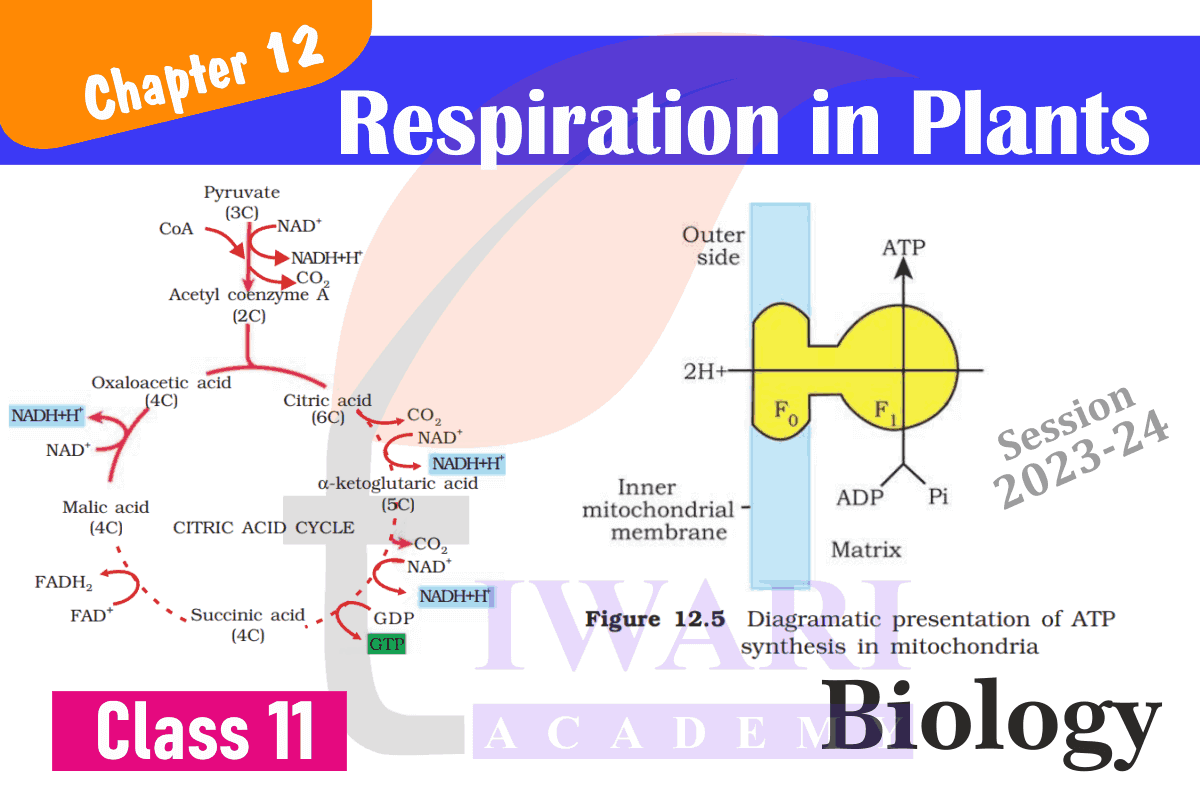
| Class: 11 | Biology |
| Chapter 12: | Respiration in Plants |
| Content: | Exercises and Extra Question Answers |
| Mode of Content: | Text, Images and PDF |
| Medium: | Hindi and English Medium |
| Applied for: | Session 2024-25 |
Class 11 Biology Chapter 12 Solutions in English
NCERT Solutions for Class 11 Biology Chapter 12 in English Medium free PDF download is given below for session 2024-25. NCERT Solutions 2024-25 and Offline Apps are based on NCERT Books 2024-25 and following the latest CBSE Syllabus. NIOS Board provides the facility to give class 12 exam without doing class 11. For any doubt, visit to discussion forum and put your questions.
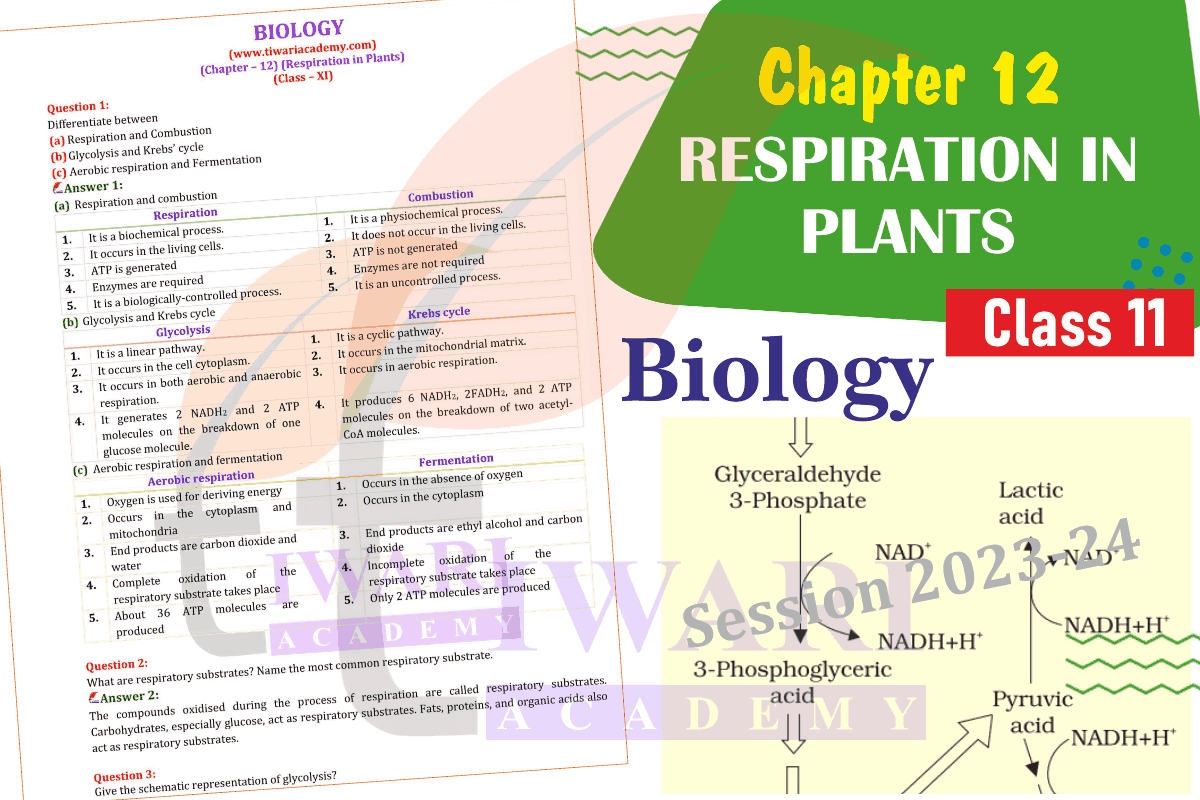
ABBREVIATIONS on Respiration in Plants
ATP: Adenosine tri phosphate
ADP: Adenosne di phosphate
NAD: Nicotinamide Adenine dinucleotide
NADP: Nicotinamide Adenine dinucleotide Phosphate
NADH: Reduced Nicotinamide Adenine dinucleotide
PGA: Phosphoglyceric acid
PGAL: Phospho glyceraldehyde
FAD: Flavin adenine dinucleotide
ETS: Electron transport system
ETC: Electron transport chain
TCA: Tricarboxylic acid (Cycle)
OAA: Oxalo acetic acid
FMN: Flavin mono nucleotide
PPP: Pentose phosphate pathway
Important Notes on Respiration in Plants
1. Aerobic respiration: Complete oxidation of organic food in presence of oxygen thereby producing CO2, water and energy.
2. Anaerobic respiration: Incomplete breakdown of organic food to liberate energy in the absence of oxygen.
3. ATP Synthetize: An enzyme complex that catalysis synthesis of ATP during oxidative phospho-relation.
4. Fermentation: Breakdown of organic substance that takes place in certain microbe like yeast under anaerobic condition with the production of CO2 and ethanol.
5. Glycolysis: Enzymatic breakdown of glucose into pyruvic acid that occurs in the cytoplasm.
6. Oxidative phosphorylation: Process of formation of ATP from ADP and Pi using the energy from proton gradient.
Glycolysis
The term has originated from the Greek word, glycos = glucose, lysis = splitting, or breakdown means breakdown of glucose molecule to pyruvic acid. It was given by Embden Meyerhof and Parnas. It is a chain of 10 reactions to convert glucose into pyruvate. It is common for aerobic and anaerobic respiration.
Important Questions on 11th Biology Chapter 12
What are respiratory substrates? Name the most common respiratory substrate.
The compounds oxidised during the process of respiration are called respiratory substrates. Carbohydrates, especially glucose, act as respiratory substrates. Fats, proteins, and organic acids also act as respiratory substrates.
What are the assumptions made during the calculation of net gain of ATP?
For theoretical calculation of ATP molecules, various assumptions are made, which are as follows. It is assumed that various parts of aerobic respiration such as glycolysis, TCA cycle, and ETS occur in a sequential and orderly pathway. NADH produced during the process of glycolysis enters into mitochondria to undergo oxidative phosphorylation. Glucose molecule is assumed to be the only substrate while it is assumed that no other molecule enters the pathway at intermediate stages. The intermediates produced during respiration are not utilized in any other process.
Discuss “The respiratory pathway is an amphibolic pathway.”
Respiration is generally assumed to be a catabolic process because during respiration, various substrates are broken down for deriving energy. Carbohydrates are broken down to glucose before entering respiratory pathways. Fats get converted into fatty acids and glycerol whereas fatty acids get converted into acetyl CoA before entering the respiration. In a similar manner, proteins are converted into amino acids, which enter respiration after deamination. During synthesis of fatty acids, acetyl CoA is withdrawn from respiratory pathway. Also, in the synthesis of proteins, respiratory substrates get withdrawn. Thus, respiration is also involved in anabolism. Therefore, respiration can be termed as amphibolic pathway as it involves both anabolism and catabolism.
Define RQ. What is its value for fats?
Respiratory quotient (RQ) or respiratory ratio can be defined as the ratio of the volume of CO2 evolved to the volume of O2 consumed during respiration. The value of respiratory quotient depends on the type of respiratory substrate. Its value is one for carbohydrates. However, it is always less than one for fats as fats consume more oxygen for respiration than carbohydrates. It can be illustrated through the example of tripalmitin fatty acid, which consumes 145 molecules of O2 for respiration while 102 molecules of CO2 are evolved. The RQ value for tripalmitin is 0.7.
What is oxidative phosphorylation?
Oxidative phosphorylation is a process in which electrons are transferred from electron donors to oxygen, which acts as electron acceptor. The oxidation-reduction reactions are involved in the formation of proton gradient. The main role in oxidative phosphorylation is played by the enzyme ATP synthase (complex V). This enzyme complex consists of F0 and F1 components. The F1 headpiece is a peripheral membrane protein complex and contains the site for ATP synthesis from ADP and inorganic phosphate. F0 component is a part of membrane protein complex, which acts as a channel for crossing of the protons from inner mitochondrial membrane to the mitochondrial matrix. For every two protons passing through F0–F1 complex, synthesis of one ATP molecule takes place.
What is the significance of step-wise release of energy in respiration?
The process of aerobic respiration is divided into four phases – glycolysis, TCA cycle, ETS, and oxidative phosphorylation. It is generally assumed that the process of respiration and production of ATP in each phase takes place in a step-wise manner. The product of one pathway forms the substrate of the other pathway. Various molecules produced during respiration are involved in other biochemical processes. The respiratory substrates enter and withdraw from pathway on necessity. ATP gets utilized wherever required and enzymatic rates are generally controlled. Thus, the step-wise release of energy makes the system more efficient in extracting and storing energy.
Important Terms related to Chapter 12
1. Biological oxidation: Oxidation in a series of reaction inside a cell.
2. Cytochromes: A group of iron containing compounds of electron transport system present in inner wall of mitochondria.
3. Dehydrogenase: Enzyme that catalyses removal of H atom from the substrate.
4. Electron acceptor: Organic compound which receive electrons produced during oxidation-reduction reactions.
5. Electron transport: Movement of electron from substrate to oxygen through respiratory chain during respiration.
6. Respiration: Biochemical oxidation food to release energy.
7. Respiratory Quotient: The ratio of the volume of CO2 produced to the volume of oxygen consumed.
8. Proton gradient: Difference in proton concentration across the tissue membrane.
